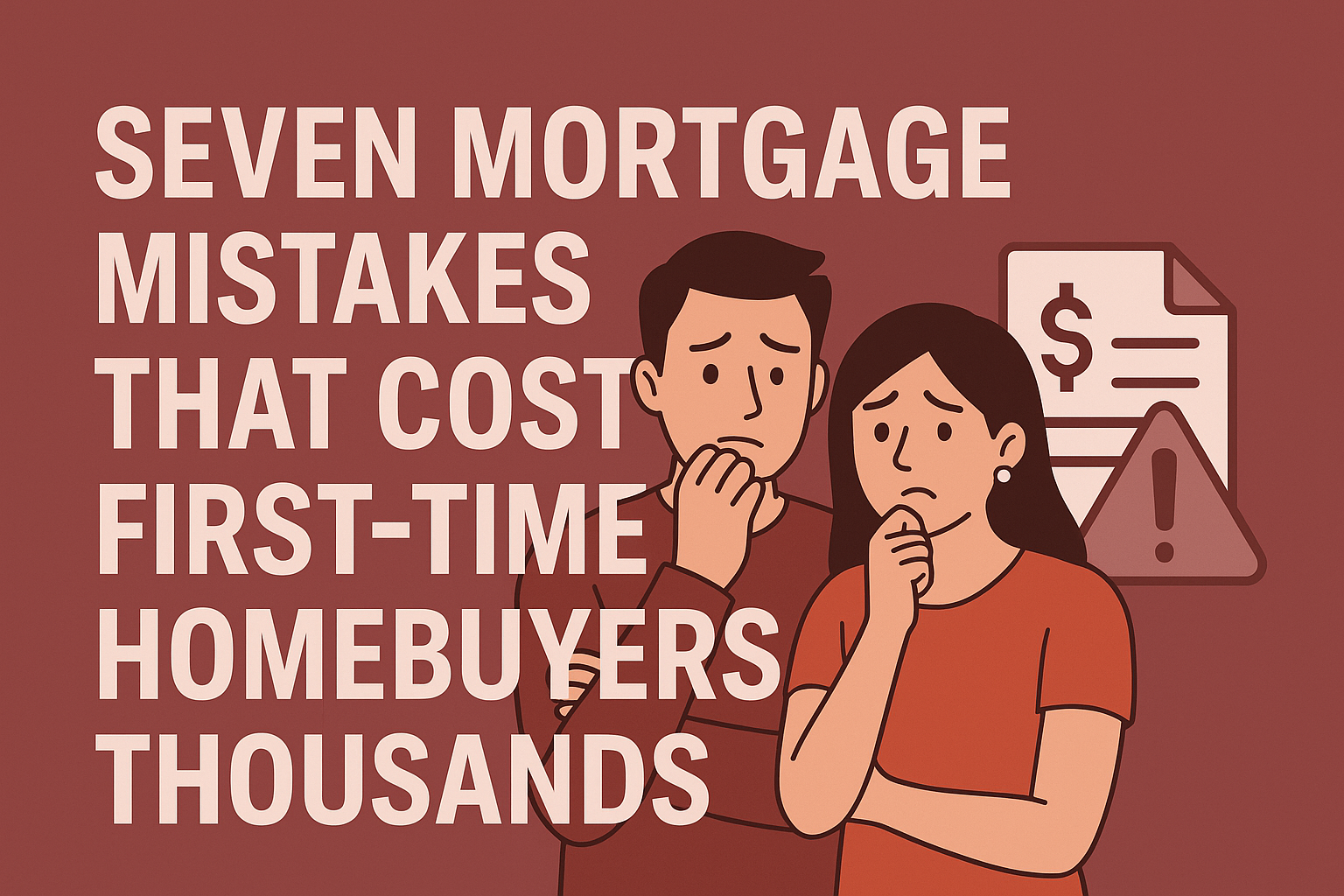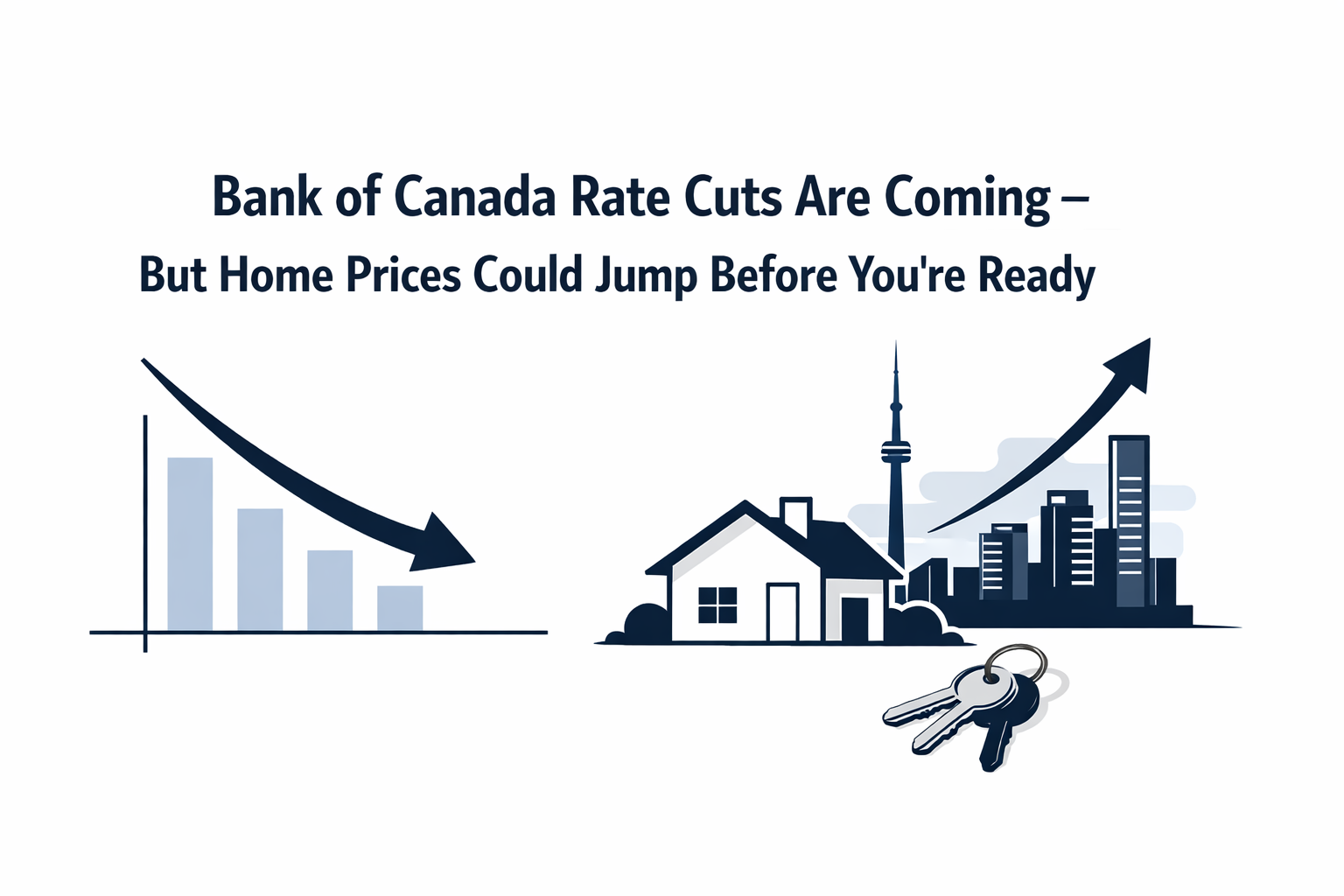Seven Mortgage Mistakes That Cost First-Time Homebuyers Thousands

Introduction
Becoming a homeowner is a huge milestone. But for many first-time buyers, what seems like the “right home in your budget” can turn into a regret-filled decision if the mortgage is mishandled. The truth is, mortgage decisions you make today (often unknowingly) can cost you thousands or even tens of thousands over the life of your loan.
In this article, I’m going to walk you through seven critical mortgage mistakes I see first-time buyers make — and more importantly, the smart moves you can use to avoid them. Whether you're in Toronto, Ontario or anywhere in Canada, these principles apply.
Let’s dive in.
1. Starting your home search before mortgage preapproval
One of the most frequent—and costly—mistakes first-time buyers make is house hunting before getting properly preapproved.
When you begin looking at homes without a solid preapproval, you run into three major risks:
- You may fall in love with a home that’s way out of your true budget.
- You weaken your negotiating power because sellers prefer buyers who already have financing secured.
- You waste time visiting properties that, under scrutiny, your mortgage application might decline.
A preapproval (not just a prequalification) gives you a verified sense of how much you can borrow, proof that you’re serious to sellers, and the confidence to act quickly when you see a home you like. It also signals to your agent and lender that you’re organized, reducing friction in the process.
How to avoid it:
- Before touring homes, gather your documents (income, credit report, debts, assets).
- Work with a trusted mortgage professional (or me 😉) to get a firm preapproval.
- Choose a time frame (e.g. 60–90 days) in which your preapproval will stay valid — then shop within that window.
2. Accepting the first mortgage offer you receive
Many first-time buyers assume mortgage offers are mostly the same, so they settle on the first one presented. That’s a huge mistake.
Every lender uses different criteria, spreads, fees, and underwriting standards. And just like interest rates on credit cards or car loans, small percentage differences add up big time over 20–25 years. According to studies, only a small fraction of buyers actually shop around for mortgage offers. Rocket Mortgage+3Investopedia+3NerdWallet+3
By skipping comparison, you may leave thousands of dollars in savings on the table.
How to avoid it:
- Request quotes from at least three lenders (banks, credit unions, mortgage brokers).
- Compare not just the interest rate, but all fees, closing costs, discount points, and terms.
- Time your applications: most credit bureaus count multiple mortgage inquiries in a 30–45 day period as one “hard pull” — so shop within a tight window.
- Use a mortgage comparison tool or ask your broker to lay out “all-in cost” projections.
3. Ignoring or neglecting your credit score and financial hygiene
Your credit score isn’t just a number — it’s one of the biggest levers dictating your interest rate, terms, and even whether a lender will approve you.
Common errors:
- Not checking your credit report for errors (e.g. collections, wrong balances).
- Carrying too much high-interest debt (credit cards, personal loans).
- Opening or closing new credit cards or lines of credit during the mortgage approval process.
- Job/job-income changes that raise red flags for lenders.
These missteps might seem small, but they can push you into a worse rate bracket, or even get your mortgage denied late in the process (just before closing).
How to avoid it:
- Order your credit reports (Equifax, TransUnion) 6–12 months before you plan to apply, and correct inaccuracies.
- Pay down high-interest revolving debt, especially credit cards.
- Avoid large purchases or opening new lines of credit in the 6 months leading up to and during the mortgage application.
- Maintain stable income and job history, or have documentation to support exceptions.
4. Overextending your “approved” amount — becoming house poor
Just because a lender approves you for a $600,000 mortgage doesn’t mean that amount is wise for your personal budget. Many first-time buyers stretch to their ceiling and end up strapped for cash.
This mistake looks like:
- Little or no wiggle room for unexpected expenses (repairs, seasonal maintenance).
- Sacrificing retirement, savings, or emergency funds to make mortgage payments.
- Panic when interest rates rise or an income dips.
You don’t want your dream home to become a burden.
How to avoid it:
- Build your budget bottom-up, starting with essentials (food, utilities, insurance) rather than letting the bank dictate.
- Include a buffer — assume interest rates rise 0.5–1% and estimate what your payment would be.
- Leave room for future life events (kids, job changes, emergencies).
- Align your mortgage payments so they remain under a responsible percentage of your income (many lenders use debt-to-income ratios; be conservative).
5. Waiving or skipping a home inspection to “win” a deal
In hot or competitive markets, some buyers waive the home inspection to make their offer more attractive. But that shortcut often leads to massive repair costs later.
What a professional inspection uncovers:
- Hidden structural damage (foundation cracks, roof issues, water intrusion).
- Electrical, plumbing, or HVAC problems.
- Pest or termite damage.
- Grading, drainage, or soil issues that may cause long-term damage.
Skipping the inspection might get you the house — but you may pay tens of thousands in repairs you never budgeted.
How to avoid it:
- Always include a home inspection contingency in your offer.
- Hire a licensed, local home inspector (ideally recommended by your agent).
- Attend the inspection in person; ask questions, take pictures.
- Use the inspection report to negotiate repairs or credits, or walk away if the issues are too severe.
6. Ignoring or underestimating closing costs and “hidden” fees
Many first-time buyers make the simple but dangerous mistake of thinking the down payment is the only upfront cost. In reality, closing costs and hidden fees often add another 2–5% (or more) on top of your purchase price.
These costs can include:
- Legal or notary fees
- Land transfer tax
- Title insurance
- Lender origination or processing fees
- Appraisal, survey, and inspection costs
- Municipal or utility adjustments
If you don't budget for these, you risk scrambling to scrape together funds at the last minute — or even delaying closing.
How to avoid it:
- Ask your lender and lawyer for a detailed Closing Cost Estimate early on.
- Add an extra buffer of 1–2% on top of the estimate.
- Don’t drain your savings — keep a reserve even after completing all purchases.
- Review every line item on your Closing Disclosure (or equivalent in your jurisdiction) to confirm you didn’t get overcharged.
7. Choosing the wrong mortgage type or term (and not planning future flexibility)
Not all mortgages are created equal. Picking the wrong type or term can cost you big both short and long term.
Some pitfalls I see:
- Opting for adjustable-rate mortgages (ARMs) without understanding eventual rate hikes.
- Locking into very long (30+ or 40-year) amortizations that increase total interest paid.
- Not planning for repayment flexibility, lump-sum payments, or refinancing options.
- Assuming your first home is forever — not thinking about resale or upgrade.
These choices affect how long it takes to pay off principal, how much interest you pay, and your ability to react if your life or the market changes.
How to avoid it:
- Analyze several term/amortization scenarios (5, 10, 15, 25 years) to see their trade-offs.
- If considering an ARM, price out what your payment could become after the fixed period.
- Always ask for “prepayment privileges” or penalty structures.
- Plan – if your career or income might grow, choose mortgages that let you make lump sum payments or refinance.
- Think ahead: when you sell or move, how easy will it be to exit or transfer your mortgage?
Putting It All Together: A Smart First-Time Buyer Checklist
Mistake #What It Costs YouSmart Move (Your Action)1. Premature house huntingTime wasted, heartbreak, weak offersSecure a firm mortgage preapproval first2. Accepting one offerPotential thousands in lost savingsShop 3+ lenders, compare “all-in” cost3. Weak credit & financial habitsHigher rates, possible denialClean up your credit, avoid new debt4. Overreaching budgetFinancial stress, no savingsLive beneath your approved ceiling5. Skipping inspectionSurprise repair costsAlways include inspection contingency6. Underestimating closing costsSurprise funds needed last minuteBudget + buffer, review line items7. Wrong mortgage choiceOverpaying interest, inflexibilityEvaluate term types, future options
Use this as a roadmap. You don’t need to be perfect — but catching even a few of these mistakes early can save you tens of thousands over time.
Real Examples & Buyer Horror Stories
(Use storytelling to reinforce your points — this helps make your content “stick.”)
- “I had a client in Toronto who waived the inspection because we were in a bidding war. Two weeks after closing, the furnace gave out and the foundation needed serious repairs. The bill? More than $25,000.”
- “Another buyer accepted the only lender they talked to. Turns out with just one more quote they could’ve shaved 0.5% off the rate — that’s over $50,000 saved over 25 years.”
- “One first-time buyer drained their emergency savings to close and was left with zero cushion. Six months later, they had to skip maintenance and fell behind.”
These aren’t hypotheticals — these are real people. And I want your journey to be different.
Quick Tips Before You Apply (Pre-Mortgage Roadmap)
- Start 6–12 months before you intend to buy: clean up your finances, reduce debt, build savings.
- Get your documents ready early: income statements, bank statements, employment history.
- Watch your credit activity: don’t open new lines, avoid large purchases.
- Save extra beyond your down payment: for closing and “just in case.”
- Find a trustworthy mortgage professional (or broker): someone who acts as your advocate, not just a salesperson.
- Lock in or float your rate wisely: understand the trade-off and risk.
- Run “what-if” scenarios: what happens if interest rates rise, your income changes, or you move sooner?
Conclusion
The path to homeownership is full of opportunity — but also pitfalls. These seven mortgage mistakes are ones I’ve watched derail too many first-time buyers. The good news? With awareness, discipline, and the right team in your corner, you can side-step them and lock in a much stronger financial future.
If you're thinking of buying soon, reach out to me (Gary Sidhu) — I’ll walk you through how to avoid these mistakes in your scenario, and help you build a mortgage plan designed for your life, not just a bank’s template.
Here’s to smart decisions, peace of mind, and a home you truly own (not one that owns you).



